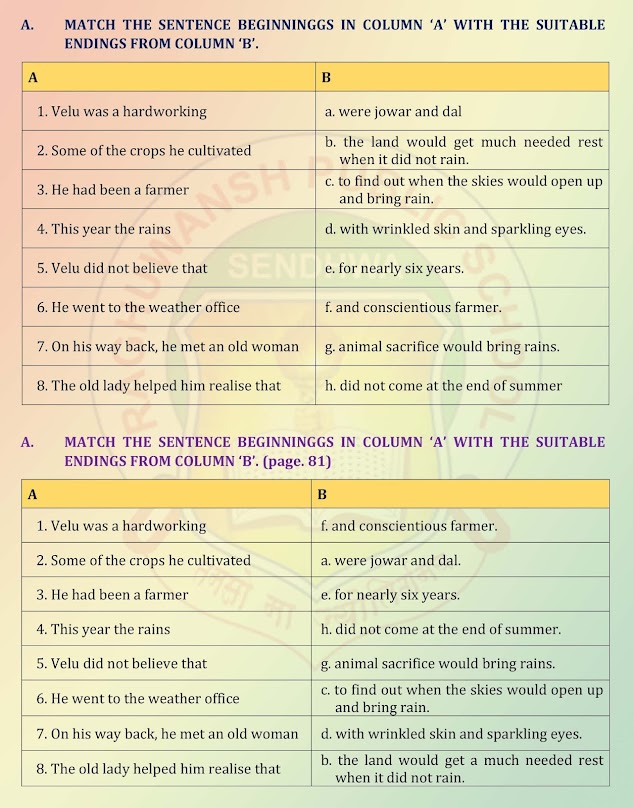B. THINK AND ANSWER
1. What does the first sentence of the text indicate to its
readers?
The first
line of the text, “I hope it rains least today”, indicates that all the farmers
are waiting for the rain.
2. His piece of land never failed him. Explain the meaning of
this sentence.
This
sentence explains that the land he cultivates has always been producing some
crops. Unlike this year, the farmer has never experienced any crop failure.
3. Throughout the year he worked, never thinking of rest of
taking a holiday. What does this tell
us about the protagonist?
This
tells us that the protagonist, Velu is a dedicated hard-working farmer.
4. Quote the lines from the text which show that the drought
lasted for a long time?
The
first instance we can find is, “Velu and
his neighbours waited, but their waiting didn’t end. Days, weeks and months
passed, and still there was no rain. The fields lay untended, the earth
hardened, crusted and cracked.”
5. And the farmers lived entirely on hope. Clarify what ‘living
on hope’ means. How were the farmers living on hope?
‘Living
on hope’ is the phrase indicates their expectation everyday that the rains
would come. They plough the land even when there is no rain, because they hope
that at the right time it would come.
6. What opinion does the writer have about the meteorological
department? How do you deduce that?
According
the writer Kamakshi Balasubramanian, the people at the weather office could not
predict the weather, as there are many favourable conditions but still not
rain, which is very odd.
7. What was the view of the old lady regarding rains and Mother
Earth? How is it different from the conventional view?
According
to the old lady when the rain does not come, it gives a little rest to Mother
Earth. In the process the Earth would spring back into activity, fresh and
ready for the crop.
8. What impression do you form about the old lady?
The old
lady is very optimistic about what is happening around. She is like someone who
could understand the nature as a living being who would get tired just like any
human being. She has the capacity to reduce the stress of the worried farmer,
Velu. In one word she is caring towards all.
9. “Without the rains, there’s nothing to smile about.” What
does this quote from the text tell us about our dependence on rain?
In a
large part of our country it is the fact that we still depend upon the rain for
crop production. Farming is a major livelihood for most of the people in our
country, but when there is draught, the survival of such farmers become really
critical.
C. DISCUSS IN CLASS
1. Rain or no rain, a farmer wakes up early. The industrious, persevering
and observant farmer is the backbone of the Indian society. Yet he does not get
his due place in the social order. Elucidate.
Farming
or agriculture is a provides the largest livelihood in India. Despite this the
agriculture in India is highly inefficient and incapable of solving the hunger
and malnutrition problem. We often hear the farmers committing suicide due to
crop failure, lower minimum support price and the burden of loans. This is the
fact of our society and of overcome this is a huge challenge before us.
2. “Nature is a mother to all of us.” Do we treat nature as a
mother who nurtures us or do we consider nature as something to be subdued and
conquered? Express your opinion.
This statement “Nature is a mother to all of us”, is matter of debate. At times I think we are caring for our nature through sustainable development, restoring ecological balance, planting trees, using biodegradable product; but in reality, even now in the name of development we destroy forests, block rivers, dump waste into middle of ocean; all in the name of development. Therefore, to a large extent we always subdue nature even though it apparently looks like we care for it.
---:THE END:---
BIJOY MARDI





